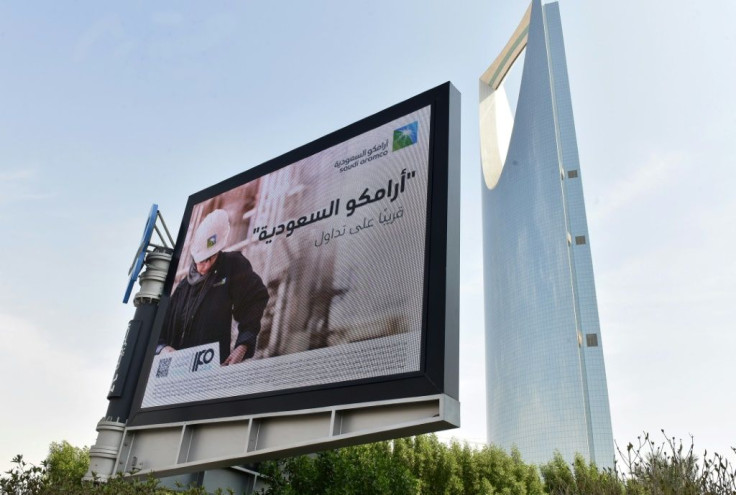Aramco IPO: Market Debut Of Saudi Arabia's Cash Cow
The stock market debut of energy giant Saudi Aramco, the world's largest company, aims to generate the billions the kingdom needs to transform its economy and prepare it for a post-oil future.
The kingdom on Sunday put a value of up to $1.71 trillion on the company, short of de facto ruler Crown Prince Mohammed bin Salman's initial target of $2 trillion.
Here are the answers to some key questions about the blockbuster listing:
The company has launched an advertising blitz, with billboards and promotional messages at shopping malls and ATMs across the kingdom.
The IPO seems to be banking on local demand, and Saudi Arabia has sought to ease lending restrictions for ordinary citizens to buy a stake in the world's most profitable company.
Local executives say some Saudis are considering selling their homes or borrowing money to purchase shares in the IPO.
Many nationalists have labelled buying Aramco shares a patriotic duty, and some clerics have given it religious sanction, saying it was permissible in Islam.
Separately, the government has reportedly pressed wealthy Saudi business families and institutions to invest.
Saudi Arabia says the energy colossus is valued at up to $1.71 trillion. Prince Mohammed's desired valuation of $2 trillion has met with widespread scepticism from investors and analysts say the price flagged Sunday is a compromise.
The plan is to sell 1.5 percent of the company in the IPO, and it is taking bids from investors in a price range of 30-32 Saudi riyals per share ($8-8.5).
If priced at the top end of the range, it could eclipse the $25 billion float of Chinese retail giant Alibaba in 2014 to become the world's biggest IPO.
The company is the world's most profitable, posting $111.1 billion in net profits last year.

The bulk of the funds raised will go to the government's vast Public Investment Fund, the kingdom's main investment vehicle.
The PIF seeks billions of dollars to finance the kingdom's transformation from a petro-state to a tech-focused economy.
It has taken radical steps to boost its treasure chest to finance a host of big-ticket non-oil investments -- from risky high-tech startups such as Uber to the $500 billion NEOM mega city to be built in the kingdom's northwest.
Aramco is a notoriously secretive company, but it was required to lift the lid on its operations in the IPO prospectus issued which listed the risks and strengths that investors must take into account.
With Saudi Arabia facing off with regional rival Iran, and leading a military coalition bogged down in a disastrous war in neighbouring Yemen, Aramco noted that political and social unrest in the region may affect its operations.
In September, attacks on two of its facilities temporarily halved the kingdom's crude output and caused turmoil on global energy markets.
The prospectus said the Saudi government determines the kingdom's maximum level of crude oil production -- a dynamic analysts say could create tensions between the interests of the company and of the authorities.
On the plus side, its reserves stood at 256.9 billion barrels of oil equivalent at the end of last year -- sufficient for 52 years, much longer than the five major international oil companies who claim between nine and 17 years.
Its production costs are among the lowest in the world due to the unique nature of the kingdom's geological formations. In 2018 costs were just $2.80 a barrel.
Ironically, the state-owned firm must spur investors' appetite for energy assets even though the goal of the mammoth IPO is to look to a future when the world will switch to clean, renewable sources of power.
One striking element in the prospectus was a warning that global oil demand may peak within the next 20 years, citing a forecast from industry consultant IHS Markit.
"Absolutely. I think that... the pressure from climate change has come to the fore as the most pressing factor affecting the valuation of Aramco," said Hossein Askari, a professor of international business at George Washington University.
Aramco, which pumps almost 10 percent of global oil, acknowledged the potential impact of the transition towards clean energy, including the risk of litigation as a result of adverse effects from global warming.
Saudi Arabia and its Gulf partners, whose coffers largely depend on returns from fossil fuels, have an uneven record on the transition to renewables.
© Copyright AFP 2024. All rights reserved.











